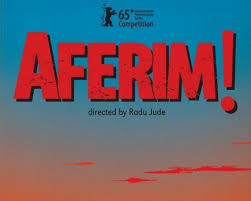
AFERIM!
Romania, 2015, 108 minutes, Black and white.
Teodor Corban, Mihal Comanolu, Cuzin Toma.
Directed by Radu Jude.
This is a harsh film, depicting some of Romania’s history, in 1835, in a remote area, under the power of the Ottoman Empire, but also ruled by the local authorities, the boyars, trying to maintain order in a rough society and be loyal to the Turks.
The framework of the film is a journey by a local constable and his son, his apprentice, searching for a runaway gypsy who has stolen money from the boyar. In fact, the man is innocent, and has been accused because he has had a sexual relationship with the boyar’s wife.
With graphic black and white photography, the film shows the journey of the two men, the different communities that they encounter, including an Orthodox monastery where gypsies have been employed to work, a river where gypsies pan for gold, encountering a travelling monk and fixing the wheel of his cart while he gives an extraordinary and belligerent summation of prejudices in Romanian society, especially against the Jews, with strange interpretation of Jewish giants, but following through with a criticism of the major countries of Europe. Father and son have many conversations illuminating how society was at the time.
They pay a bribe to a neighbouring authority who gives information about where the gypsy could be found and they follow through to the village. However, they are somewhat sympathetic to the gypsy when they eventually find him. They stay the night in the village for a rather raucous time of drinking and sexual activity.
By the end of their journey, they are back home, presenting their captive to the boyar, the wife being made to confess, a fierce and shocking punishment for the gypsy, and life returning to normal.
This is a striking reminder of how human nature is prone to barbarity along with its gentle qualities.
1. Romania? 1835? Wallachia? The title of the film and its meaning and use of the dialogue?
2. Black-and-white photography, stark, the credits and the quivering tree? The hill, the plains, the sheep on the road, forests, swamps, the villages, the panning for gold, poverty? The Gypsy camps? The tail? Costumes, decor, the musical score?
3. 1835, the politics for Romania, the influence of the Turks, the Ottoman Empire, the influence of the Russians? The local chiefs? Their authority? The constable and his assistant? The role of the military?
4. A harsh film, harsh times, the land, the rough dialogue, the shouting and yelling, the brutality?
5. The revelation of the national and religious prejudice? The gypsies and their being called crows? The disdain of the Orthodox Church? The gypsies as slaves? The travelling monk, the constable fixing his carriage wheel? The dialogue, the prejudice against the Jews? His outbursts about Jews, the Jewish giants, all the other nations and detrimental comments? The brutal outlook? But seeing the Romanians as victims?
6. The constable and his quest, on the hill, the conversation between father and son, the role of the constable, his son as the assistant? The son and his practising his sword movements, the tree trunk? His father considering him girly? Pampered by his mother? The father’s hopes, the military career, training, the police work, the sexual initiation in the town? The travel and the search for the gypsy, Carfin?
7. The discussions about the plague and its effect, the descriptions of the dead, meeting the old woman with the cart, denouncing her for having cholera? The sheep on the road? The continued travel, resting, going to the village, hunting the gypsies, the monastery, the Abbott, the questioning, the brutal methods, the monks as overlords, going to the camp with the gypsies panning the gold?
8. In the forest, the fisherman, getting the fish, paying him?
9. Going through the swamps, turning back? Encountering the neighbouring authorities? The payoff for information, going to the village, searching the houses, finding the young boy hidden, the discovery of Carfin? His being taken?
10. Nights in the village, eating and drinking, talking, Carfin and his being bound, getting something to eat? The memories of the war, the father and his own youth? Sending his son for his sexual encounter? His own sexual encounter and impotence? The stories of pillaging and raping?
11. The return with Carfin, in the stocks? Accusing boyar’s wife, forcing her to confess?
12. The boyar arriving, his pomp, his hat and robes? The constable and his audience with him? The promoting the cause of Carfin? The official document?
The boyar and his threats? Taking the situation into his own hand? The brutality of the castration, his treatment of his wife?
13. The aftermath, the return home, the son and his future?
14. The film communicating what it was like to live at that time and in that place?